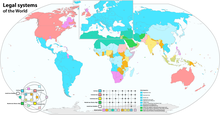
Back قانون مقارن Arabic Derechu comparáu AST Müqayisəli hüquq Azerbaijani Сравнително право Bulgarian Komparativ ret Danish Vergleichende Rechtswissenschaft German Συγκριτικό δίκαιο Greek Derecho comparado Spanish Võrdlev õigusteadus Estonian حقوق تطبیقی Persian

Comparative law is the study of differences and similarities between the law (legal systems) of different countries. More specifically, it involves the study of the different legal "systems" (or "families") in existence in the world, including the common law, the civil law, socialist law, Canon law, Jewish Law, Islamic law, Hindu law, and Chinese law. It includes the description and analysis of foreign legal systems, even where no explicit comparison is undertaken. The importance of comparative law has increased enormously in the present age of internationalism, economic globalization, and democratization.